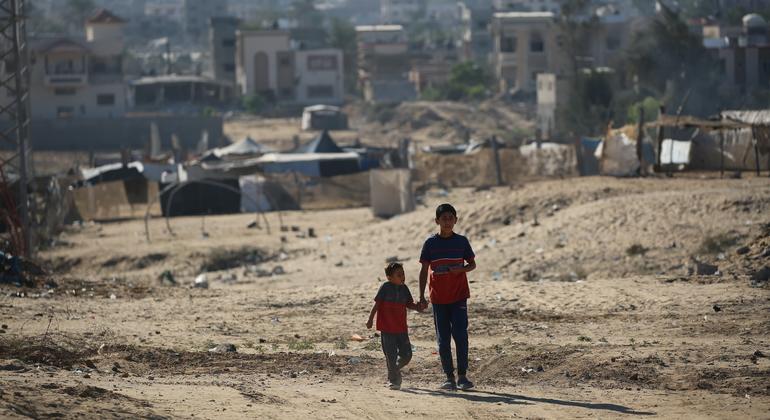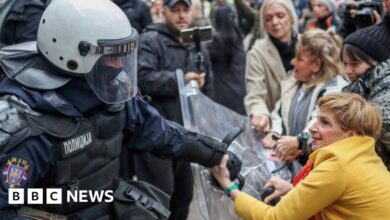UNICEF warns entire generation of children ‘missing’ in ongoing war in Gaza


Ted Chaiban, UNICEF Deputy Executive Director for Humanitarian Action, stressed the urgent need for an immediate cessation of hostilities and a negotiated political solution prioritize the rights and well-being of both Israeli and Palestinian childrennow and in the future
He was holding a press conference and answering questions from journalists at the United Nations Headquarters in New York, via video link from the West Bank, after concluding a visit to Israel and Palestine.
Conveying Children’s Pain
Mr. Chaiban recalled his meetings with Israeli children and families affected by the October 7, 2023 attacks, stating that “They asked me to be the voice of all children to convey their suffering.“ .
He added that UNICEF will work with relevant ministries in Israel to ensure children there are supported.
Mr. Chaiban also asked the Israeli government to increase access to aid and commercial goods, especially fresh food and nutritional supplies.
“I support child protection, improved security measures and standard operating procedures for humanitarian workers and facilitate the movement of lost unaccompanied children“, he said.
Risk of lost generation
In Gaza and the West Bank, a senior UNICEF official has warned of a “lost generation” of children who have lost months of schooling and suffered painful trauma.
He visited Kamal Adwan Hospital in northern Gaza – the only remaining paediatric unit in the area – and met a months-old baby with shrapnel wounds. His mother was the sole survivor of an airstrike.
“The baby is a poignant reminder of the thousands of children who have been killed and injured in the Gaza Strip over the past 11 months,” Mr. Chaiban said, citing the plight of other children suffering from cancer and other deadly diseases.
“If we don’t evacuate them quickly, they won’t be able to make it.. We will do our best together with our colleagues at WHO (United Nations World Health Organization) to get these children treated.”
Living in sewage
Mr Chaiban also described scenes of families living in overcrowded shelters in squalid conditions.
“I visited a school that had been converted into a shelter. In the middle of the schoolyard, they had dug a makeshift sewer to drain the sewage – people and children were literally living in that sewage,” he said, warning that the conditions were ripe for disease to arise and spread.
Aid deliveries to the region have dropped sharply, from an average of up to 100 trucks a day in January to just 50 in August and only 15 in SeptemberReasons include concerns about law and order, restrictions on fencing and insufficient entry points.
Cease fire now
Mr. Chaiban stressed the urgent need for a ceasefire to protect the lives of children, facilitate the delivery of vital aid and unconditionally release all hostages, especially the two children.
“In the absence of a ceasefire, we need such pauses to carry out the polio vaccination campaign,” he said, reiterating the need to strengthen security for personnel, standardize control procedures and improve telecommunications capabilities in Gaza, including the Internet.
“The continued destruction of Gaza and the escalation of violence in the West Bank will not bring peace or security to the region – this can only be achieved through a negotiated political solution that prioritizes the rights and well-being of current and future generations of Israeli and Palestinian children,” he said.
Independent human rights commission expresses deep concern
Meanwhile in Geneva earlier, leading independent human rights experts on Thursday expressed concern about the “large number” of children in Gaza killed by the war and the negative impact on Palestinian youth detained by Israel.
Following a scheduled review of Israel, the Committee on the Rights of the Child condemned the fact that children in Gaza have been “killed, maimed, injured” or “disappeared, displaced, orphaned and subjected to hunger, malnutrition and disease due to [Israel’s] indiscriminate and disproportionate attacks”.
According to the Palestinian Authority, more than 11,300 children have been killed since Israel began bombing Gaza on October 7 in response to Hamas-led terrorist attacks.
The Committee on the Rights of the Child – whose members are not UN staff – also said it was deeply concerned about “the continued abduction, arbitrary arrest and prolonged detention of large numbers of Palestinian children by Israeli forces, largely without charge, trial or legal representation”.
Exploding pagers are ‘a terrifying violation’: Rights experts
In the wider Middle East, independent United Nations human rights experts on Thursday condemned the “malicious manipulation” of thousands of pagers and walkie-talkies exploding simultaneously across Lebanon and Syria, describing the attacks as a “horrific” violation of international law.
“A climate of fear now pervades daily life in Lebanon,” Human Rights Council– the appointed experts said in a News release.
The attacks are believed to have killed at least 32 people and injured or disabled 3,250, including 200 critically.
Among the dead were a boy and a girl, as well as medical staff. About 500 people suffered serious eye injuries, including a diplomat. Others suffered serious injuries to their faces, hands and bodies.
“These attacks violate the right to life, with no indication that the victims posed an immediate mortal threat to anyone else at the time,” the experts said, calling for a prompt and independent investigation to establish the truth and accountability.
Camouflage trap
Experts also note that international humanitarian law prohibits the use of booby traps disguised as seemingly harmless handheld objects.
That suggests that at the time of the attack, there was no way to know who owned each device and who was nearby.
“Simultaneous strikes using thousands of devices would certainly violate humanitarian law, as individual targets would not be identified and there would be no distinction between protected civilians and those likely to be attacked because of their direct involvement in the fighting,” they said.
Appointed by the Geneva-based Human Rights Council, the experts are tasked with monitoring and reporting on thematic and country-specific human rights situations. They are independent of the United Nations, are not UN staff, and are unpaid.




